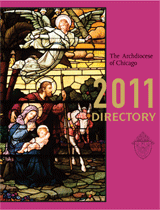Director wants to see more black Catholics in ministry

A regular feature of The Catholic New World, The InterVIEW is an in-depth conversation with a person whose words, actions or ideas affect today's Catholic. It may be affirming of faith or confrontational. But it will always be stimulating.
Mary Norfleet-Johnson is no stranger to the Archdiocese of Chicago. Before taking over as director of the Office for Black Catholics, Norfleet- Johnson was catechetical coordinator for vicariate VI and black Catholic catechesis in the Office for Catechesis and Youth Ministry.
She has a little different focus today with her new position. It is to better bring black Catholics together with the wider Catholic community in the archdiocese.
She spoke with Joyce Duriga about her plans for the office.
Catholic New World: You have said there are misconceptions the Catholic Church has about black Catholics and misconceptions black Catholics have about the church. Would you explain what these misconceptions are?
Mary Norfleet-Johnson: Black Catholics have long felt like second-class Catholics in the Archdiocese of Chicago. We have always had very little representation and input into archdiocesan events, programs and policies. There is a disproportionate number of black clergy to serve the black Catholic community.
We want to be an integral part of the church. We want our voices heard but all too often we are not invited to be a part of decision making in the archdiocese or our churches.
Even though our liturgies are liturgically correct some Catholics have labeled them as Protestant because we choose to introduce our African culture into our liturgies. We are also often thought of as not being educated enough to hold positions of ministerial leadership in our churches or at archdiocesan levels.
CNW: One of your goals for your office is to recruit more black Catholics to serve in the church. Why is this important and how do you hope to do that?
Norfleet-Johnson: As I stated earlier, there is a misconception that only a few black Catholics because of their education are qualified to be in positions of leadership in the church. The Office for Black Catholics will focus on identifying and supporting those persons, especially young adults, who exhibit a desire to work in ministry in the black Catholic community and who want to further their education either as lay ministers or religious.
This is very important for the black Catholic community because we need more ministers, lay and religious, who are knowledgeable and empathetic with the hopes, struggles and dreams of the black community. We need more black Catholic role models in our community.
CNW: Just like with other groups of Catholics, black Catholics are concerned about the numbers leaving to join other denominations. Why are black Catholics leaving our churches and how can we bring them back?
Norfleet-Johnson: Many black Catholics are leaving the church because of the lack of meaningful homilies, music and in most instances pastoral leadership that cannot relate to the everyday issues being faced by the black community. In many instances black Catholics are faced with church leadership that dismisses the issues of racism, sexism, violence, the economy and all the societal issues that directly affect the black community.
CNW: You’ve also said that there is a need for better communication between black Catholics and the archdiocese. How can that communication be improved?
Norfleet-Johnson: The many agencies and departments of the archdiocese must be open and inviting to the black Catholic community. The archdiocese must design and implement programs and events with black Catholics in mind not as an afterthought.
The archdiocese must be willing to invite the black Catholic religious as well as the lay community to the table and not dismiss their suggestions and comments whether they are positive or negative when expressed.




